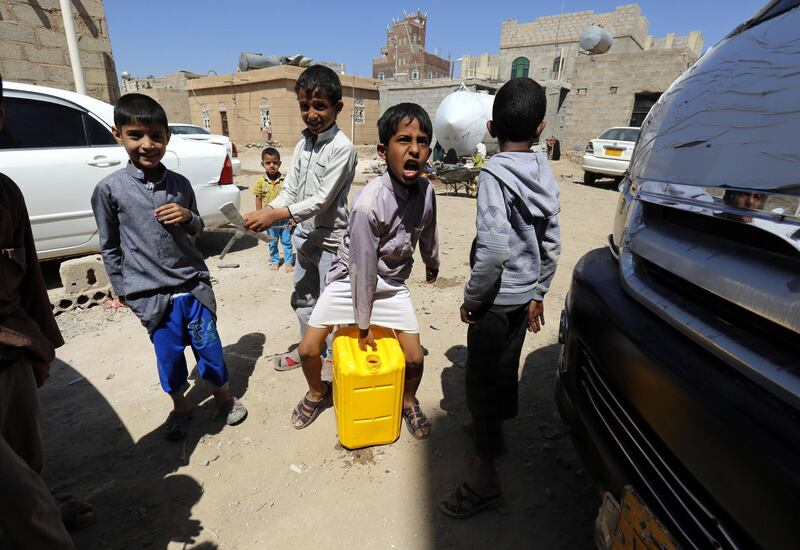Millions of people in Yemen are on the brink of famine as aid agencies struggle to find ways to ensure relief reaches those in need, despite assistance from the UAE and Saudi Arabia.
Houthi militias are accused of blocking vital aid from entering vulnerable cities as the country experiences one the worst humanitarian crisis in the world, Hamza Al Kamali, a member of the Yemeni government delegation to Geneva, told The National.
"The rebels are using a policy of deliberate starvation and coercion in areas such as Taiz and the port of Hodeida. This is the underlining problem of the catastrophe," Mr Al Kamali said,
The Yemeni official said that the militias are not providing any services to the public in areas that are under their control. Instead, they are pressuring the international community and the Arab Coalition to become a legitimate faction in the government.
Areas that the Yemeni government are not in control of remains a sticking point in the crisis, Mr Al Kamali said.
The United Nations warned on Wednesday that Yemen is facing "the world's worst hunger crisis, with almost 18 million people throughout the country not known where their next meal is coming from".
"Over eight million people are already considered to be on the brink of famine in Yemen," World Food Programme (WFP) spokesman Herve Verhoosel said, adding that the situation was being exacerbated by sky-rocketing food prices, which have soared by a third in the past year alone.
If the situation continues, there will be an additional 3.5 million Yemenis, or nearly 12 million, that will require urgent food assistance, Mr Verhoosel warned.
However, due to the dire security situation on the ground, the UN agency may not be able to increase its activities in the country to provide emergency care to the country's hungriest people.
"We need an end to the fighting," he said.
It comes as Yemen's local currency has been deteriorating, increasing the price of food and fuel and fueling fears of a catastrophic humanitarian crisis.
One of the biggest challenges to humanitarian work in Yemen is the highly volatile security situation and access to those most in need, spokeswoman of the International Committee of the Red Cross (ICRC), Jessica El Zarif told The National.
"The impact of the conflict on medical facilities and essential infrastructure is worsening the humanitarian consequences for Yemenis. Only 45 per cent of health facilities in Yemen are functioning," Ms El Zarif said.
ICRC has reported cases of all kinds of preventable diseases re-emerging including cholera, meningitis, measles and diphtheria are yet another reminder of the incapacity of Yemen’s health system to cope with ever increasing needs.
“Civilians must not pay the price of conflict, any loss of life, further fuels the conflict and generates more suffering and grief,” Ms El Zarif said.
Earlier this month, the UN children's agency (Unicef) suspended cash transfers to nine million citizens, citing pressures from the Houthi militias.
UNICEF said the decision came after it was unable to set up a call centre to get feedback from beneficiaries, without providing further details.
Meanwhile, on Thursday, the Emirates Red Crescent (ERC) said it has sent a relief convoy consisting of 1,500 food baskets and five tonnes of food supplements for children of the Al Azariq district in Dhale Governorate.
The ERC is expected to provide more than Dh107 million to help rebuild roads, schools and hospitals on the west coast of Yemen.
The area, which runs from Bab Al Mandeb to Hodeidah, has been largely liberated from Houthi militia control following a ground offensive by the Arab Coalition which began in June.
The Arab Coalition along with the legitimate government of Yemen are carrying out “genuine” and “real” humanitarian assistance to civilians, Mr Al Kamali said.
According to an international report, the UAE is the largest donor of humanitarian assistance to Yemen after Saudi Arabia.
Mr Al Kamali revealed development plans to establish humanitarian centers around the country in order to prevent the Houthis from controlling and using them for economic means.
The country's civil war, which began when the Iran-backed rebels seized Sanaa, the capital, in September 2014, has left 22 million people — about 75 per cent of the population — in need of assistance, according to the UN.
_____________________
Read more:
Yemen's new prime minister brings hope to economic crisis
Two dead in Yemen after flash floods hit east
Yemen president Abdrabu Mansur Hadi fires prime minister, citing 'negligence'
_____________________





